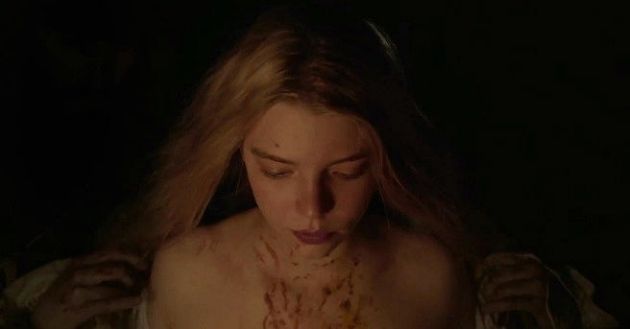
Rich in historical details and atmosphere, The Witch sets out to destroy two archetypes associated with the world of New England pilgrims: patriarchy and puritanism. First time director Richard Eggers smartly goes about making a film that is both disturbing and joyous(?). What I am most impressed about the film is that Eggers clearly understands less is better. Seemingly shot only on natural lights and practicals (candles for indoor shots), the film lends itself a period documentary feel to it. General witch hysteria is kept within a family but that doesn't mean it's short on drama or tension.
The film starts with a family being cast out of the walled settlement. The reason, as we find out later, is because of the father William (Ralph Ineson)'s pride. He is one of those know-it-all, holier than thou types. William turns out to be incapable at anything. Crops are going to fail and they will starve but he is too proud to go back to the community nor back to England.
The focal point of the film is Thomasin (Anya Taylor-Joy), a teenage daughter and eldest of 5 of William and Katherine (Kate Dickie). Thomasin's younger siblings, Caleb and fraternal twins - Mercy and Jonas have minds of their own and develops into memorable characters as well. The twins, too little to know what's at stake living alone in the land without support system, are going stir crazy, making up stories and agitating everyone around them. In order to shut them off, Thomasin tells them that she is a witch in jest. Big mistake. Caleb, a kid who is beginning to notice opposite sex, can't help glancing at Thomasin's growing bosom. Things start to turn dark and weird when Samuel the baby gets snatched away from Thomasin's care. The next scene we see is a scary old naked hag pounding something in a stone mortar and smearing bloody pulp all over her body.
Katherine goes hysterical and start losing her marbles when Caleb gets taken by a seductress in the forest (probably the same hag in disguise) then returns naked, bitten and feverish. Barnyard goats start producing blood instead of milk. Parents accuse children of witchcraft and lock them in a barn. Then a goat starts talking.
Things get violent as the film develops, in a very uncomfortable, disturbing way. Eggers paints rather a gruesome, fearful picture of female empowerment. I haven't decided that if objectification of young blonde female by not an adult male but by even younger male, a brother at that, is any more progressive than much maligned 'male gaze' riding on the back of feminism, but The Witch is at least an interesting take on grrrl power and a conversation starter.